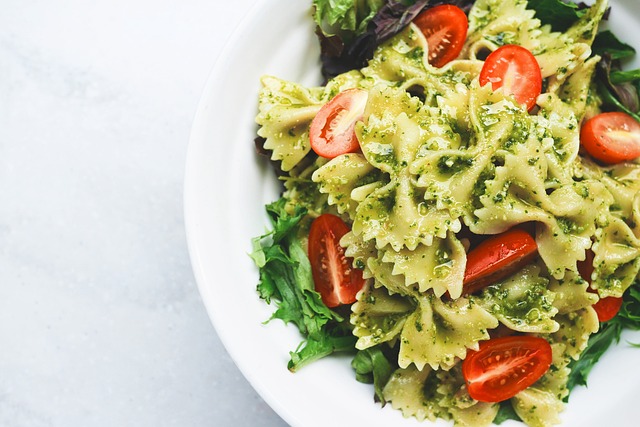The article discusses the challenges and solutions for individuals with food allergies and intolerances, particularly highlighting the role of local food delivery and meal preparation services. These services are designed to cater to dietary restrictions by offering tailored menus free from allergenic ingredients, ensuring safety through detailed ingredient information and avoiding cross-contamination. They play a crucial role in accommodating various conditions like peanut allergies and lactose intolerance, providing flavorful alternatives that maintain nutritional balance. The article emphasizes the importance of clear communication with these services to specify dietary restrictions and avoidable ingredients, and advises choosing local food delivery providers that specialize in allergen-sensitive diets for both health management and community support. These services not only offer convenient access to safe meals but also help maintain a diverse culinary experience, fostering an inclusive community atmosphere within the local culinary landscape. By partnering with area restaurants and chefs, these local food delivery services enhance their menu offerings while upholding high allergen standards, making them an essential resource for those with dietary restrictions.
Navigating the culinary landscape with food allergies or intolerances can be a challenge, yet with the rise of informed consumption, local food delivery services have become instrumental in catering to dietary needs. This article delves into the nuanced differences between food allergies and intolerances, highlighting the critical role these services play in providing safe, customized meal options. We will explore practical strategies for meal preparation tailored to these restrictions, offer guidance on effective communication with chefs and providers for bespoke orders, and discuss how fostering a support network through local delivery can enhance the quality of life for those managing such conditions. Join us as we shed light on the intersection of health and hospitality, where ‘Local Food Delivery’ and ‘Meal Preparation’ are not just keywords but pillars of everyday well-being.
- Understanding the Difference Between Food Allergies and Intolerances
- The Role of Local Food Delivery Services in Accommodating Dietary Restrictions
- Strategies for Meal Preparation to Cater to Food Allergy and Intolerance Needs
- How to Safely Communicate and Collaborate with Chefs and Providers for Custom Orders
- Building a Community Support Network for Managing Food Allergies and Intolerances through Local Delivery Services
Understanding the Difference Between Food Allergies and Intolerances

Navigating the world of dietary restrictions can be challenging, especially with the prevalence of food allergies and intolerances. It’s crucial for individuals to understand the differences between these conditions to manage them effectively. Food allergies are immune system responses to specific proteins found in particular foods. They can range from mild to life-threatening and require strict avoidance measures. For instance, an allergy to peanuts can trigger symptoms like hives, wheezing, or anaphylaxis. On the other hand, food intolerances involve the digestive system and are less severe than allergies but can still be debilitating for those who experience them. Lactose intolerance, a common condition, occurs when the body lacks sufficient lactase enzyme to break down lactose, a sugar found in milk and dairy products, leading to gastrointestinal discomfort.
Understanding one’s condition is pivotal for individuals to lead healthy lives, and this understanding is where local food delivery services and meal preparation solutions become indispensable. These services cater to specific dietary needs by offering menus that are carefully curated to avoid allergenic ingredients. For those with allergies or intolerances, the ability to order from a trusted source that guarantees safety and transparency is invaluable. Such services often provide detailed information about ingredient sources and preparation environments, ensuring peace of mind for consumers. Additionally, meal prep options allow individuals to plan their meals ahead of time, ensuring that each meal aligns with their dietary restrictions without compromising on flavor or variety. This personalized approach to eating not only supports the health and well-being of those with allergies and intolerances but also enhances the overall dining experience.
The Role of Local Food Delivery Services in Accommodating Dietary Restrictions

Local food delivery services have become increasingly adept at catering to individuals with dietary restrictions, such as food allergies and intolerances. These services understand the importance of providing safe, accurate, and enjoyable dining experiences for customers with specific needs. By maintaining detailed records of each customer’s dietary preferences and restrictions, local food delivery services can ensure that meals are prepared without exposure to unwanted ingredients. This level of personalization extends beyond simple avoidance; it includes tailoring recipes to incorporate alternative ingredients that offer both nutritional value and taste satisfaction. The result is a diverse range of meal options that not only comply with dietary restrictions but also delight the palate. Furthermore, these services often collaborate with local restaurants and chefs to expand their offerings, ensuring a wider variety of dishes that adhere to stringent allergen protocols. This collaboration not only benefits those with dietary restrictions but also promotes a culture of inclusivity within the local food scene, demonstrating the commitment of these delivery services to accommodate all members of the community with care and professionalism. The role of meal preparation in this context is crucial, as it requires meticulous attention to detail and a deep understanding of nutritional science to create meals that are both safe and satisfying. Local food delivery services that excel in this area are not just providing a service but are actively participating in the health and well-being of their community by offering reliable access to diet-specific meals.
Strategies for Meal Preparation to Cater to Food Allergy and Intolerance Needs

When crafting meals that cater to food allergy and intolerance needs, careful planning and an understanding of specific dietary restrictions are paramount. Local food delivery services have increasingly adapted to this demand by offering tailored meal plans that accommodate a variety of allergies and sensitivities. These services often provide detailed information on ingredient sourcing, preparation methods, and potential cross-contamination risks, ensuring that customers can make informed choices based on their health requirements. For those who prefer to cook at home, meal preparation strategies should include a thorough reading of food labels, keeping a well-stocked pantry with safe ingredients, and developing versatile recipes that can be easily modified to exclude allergens. Cross-contamination can be mitigated by using dedicated cooking utensils and surfaces, which is particularly important for individuals with severe allergies. Additionally, maintaining open communication with both the food supplier and household members about dietary needs helps prevent accidental exposure to trigger foods. By integrating these practices into meal planning and preparation, individuals with food allergies and intolerances can enjoy a diverse range of flavors and dishes while minimizing health risks. Furthermore, leveraging local food delivery services that specialize in allergen-sensitive menus not only enhances convenience but also supports the local economy, making it a win-win solution for dietary management and community engagement.
How to Safely Communicate and Collaborate with Chefs and Providers for Custom Orders

When engaging with chefs and providers for custom orders that cater to food allergies and intolerances, clear and effective communication is paramount. Individuals with such dietary restrictions should initiate conversations with potential service providers by clearly stating their needs and any specific ingredients they must avoid. Utilizing local food delivery platforms can facilitate this dialogue, as these services often have systems in place to handle dietary preferences and allergies. It’s advisable to provide a detailed list of the off-limit ingredients to the chefs preparing your meal. This ensures that cross-contamination is minimized and that the provided information is fully understood and taken into account. For those opting for meal preparation services, it’s equally important to discuss any dietary requirements during the initial consultation. Providers should be willing to adapt recipes to exclude problematic ingredients without compromising on flavor or quality. Establishing a rapport with local chefs and providers can lead to a more personalized and reliable service, as they become more familiar with your specific needs. By fostering a collaborative relationship, you empower them to create dishes that are both safe for consumption and enjoyable.
To further ensure safety and satisfaction, it’s recommended to verify the provider’s knowledge and experience in handling special dietary requests. This can be done by asking for references or reviews from other customers with similar needs. Additionally, for ongoing meal preparation services, maintaining an open line of communication allows for any adjustments to be made as needed. For instance, if a new allergy is diagnosed or if ingredients become unavailable, the provider should be informed promptly to adapt accordingly. By leveraging local food delivery services that specialize in accommodating dietary restrictions and prioritizing clear communication, individuals with food allergies and intolerances can enjoy a wide array of culinary experiences tailored to their health needs.
Building a Community Support Network for Managing Food Allergies and Intolerances through Local Delivery Services

Managing food allergies and intolerances can be a complex task for those who are affected, often requiring careful planning and vigilant oversight to ensure safety and well-being. One effective approach to this challenge is building a community support network that leverages local food delivery services. These services play a pivotal role in providing individuals with dietary restrictions access to meals tailored to their specific needs. By partnering with restaurants, grocery stores, and meal preparation companies, local delivery services can offer a reliable source of safe, pre-planned meals. This collaboration ensures that those with food allergies or intolerances have a diverse selection of foods to choose from, catering to their health requirements while also supporting local businesses.
Furthermore, these community networks can extend beyond individual transactions by fostering communication and sharing among members. Through online platforms and support groups, individuals can exchange experiences, recipes, and advice on managing food allergies and intolerances. This communal approach not only enhances the quality of life for those with dietary restrictions but also promotes awareness and understanding within the community at large. By leveraging local food delivery and meal preparation options, these networks provide a sustainable solution that prioritizes health, accessibility, and community engagement.
In conclusion, managing food allergies and intolerances has become increasingly straightforward with the advent of tailored meal preparation strategies and the commitment of local food delivery services to accommodate dietary restrictions. The distinction between food allergies and intolerances is crucial for personal health management, and understanding this difference empowers individuals to make informed decisions about their diet. Local food delivery services play a pivotal role in providing accessible and safe options for those with such conditions. By employing specialized meal preparation techniques and fostering open communication with culinary professionals, these services ensure that every order is prepared with the utmost attention to safety and personal needs. Furthermore, building a community support network through local delivery platforms offers an additional layer of support for managing these dietary challenges. The synergy between informed consumers, dedicated meal planners, and responsive delivery providers creates a robust system that can cater to a variety of nutritional requirements. With these resources at hand, individuals with food allergies and intolerances can enjoy diverse and healthy meals with the assurance of safety and satisfaction.
